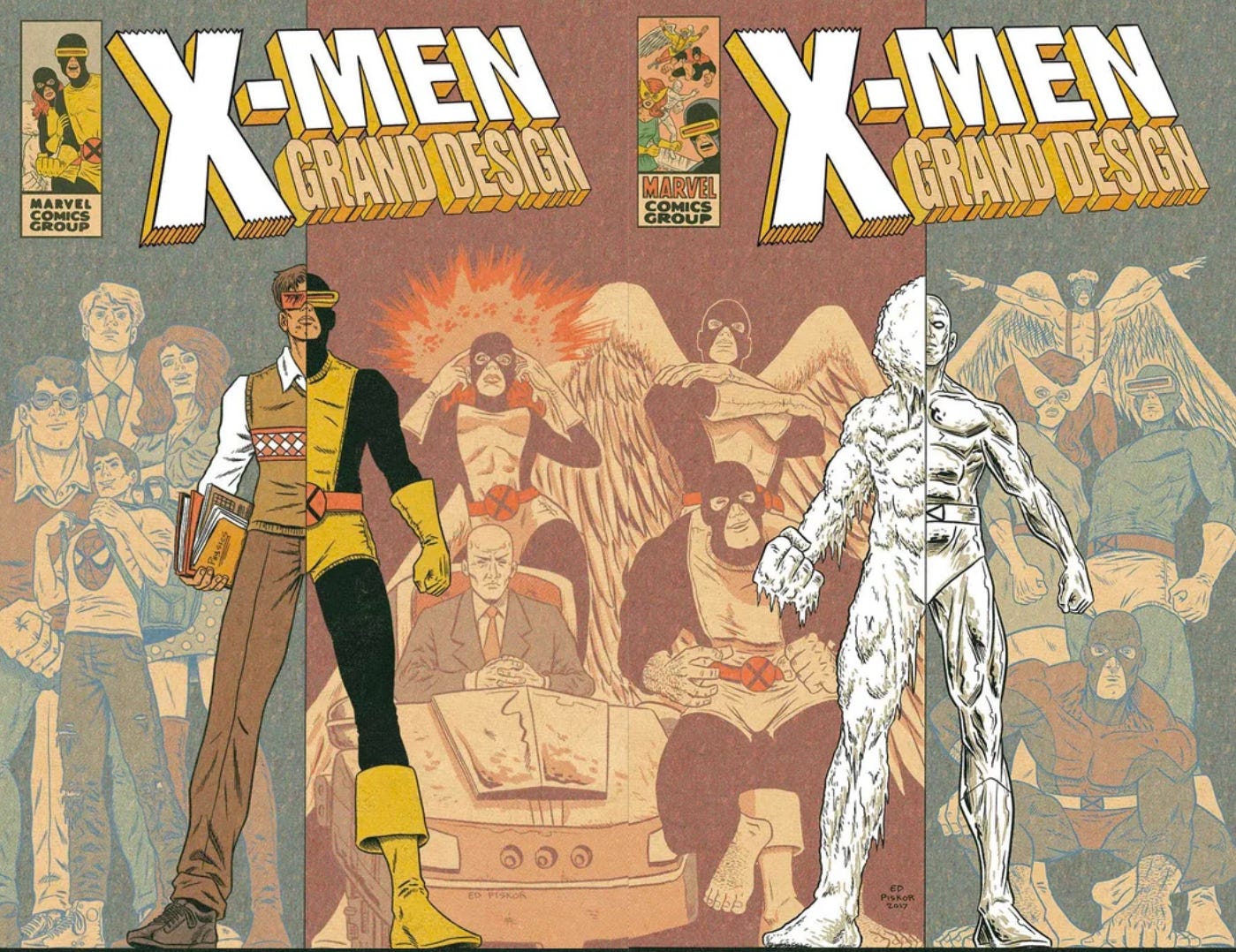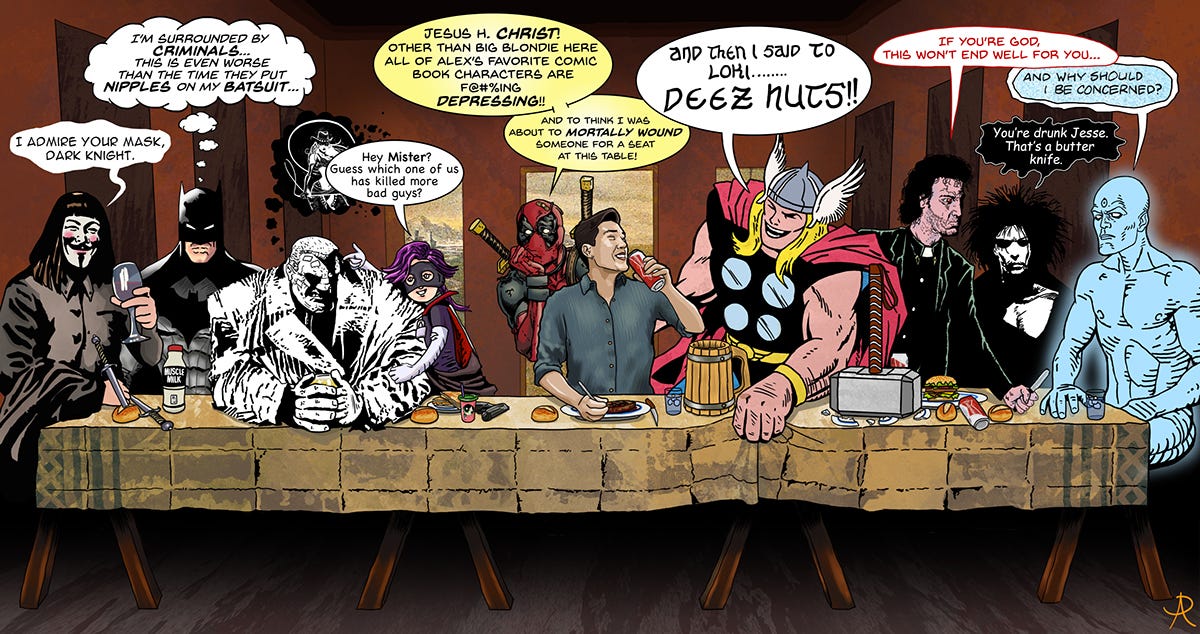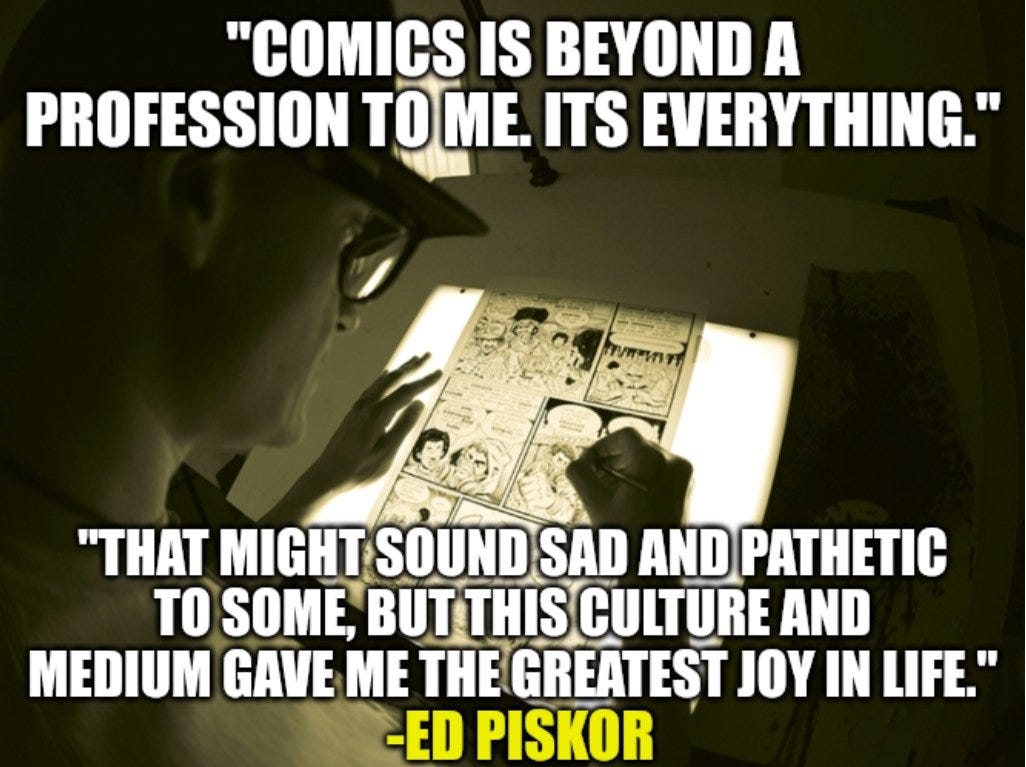So, before i start this rant and it will be a rant. I have a few things to state for the record. I am so sorry, for the people who came forward speaking out about Ed Piskor. I always feel that you should feel safe to speak your truth. I feel our world has been silent for too long and we have taught people to be silent. That is not the way the world should be. However, there is a lot of voices that want to be heard and some art hurting our community.
So, let me start by sharing this statement that i made on Twitter.
Victims should be allowed to come forward and not be shamed.
Suicide is tragic.
BOTH CAN BE TRUE.
Ok? We good? I am gonna address that again at the end to make it clear but I want to make sure that my speaking about Ed Piskor doesn’t mean i feel they did anything wrong by coming forward.
So, lets talk about Ed Piskor and more important CANCEL CULTURE IN COMICS. Ed Piskor was a very important voice to me in comics. I have listened to almost all of CARTOON KAYFABE and enjoyed XMEN: GRAND DESIGN
What makes this even more interesting is i’m not a huge fan of his work. This is shocking because i am deeply effected by his death but i gotta be honest. I don’t love HIP HOP FAMILY TREE. I dont love RED ROOM. These are books that just dont hit my vibe check. I love his style but those books weren’t made for me. What i am a fan of is his love of comics. His deep love for the medium and how he care so deeply about the craft, the beauty and the flat-out love for the medium on a level that you can describe. I feel he loved comics more than I do and that is super rare. So, many people looked up to him. My favorite interview is this one.
I also love the NINJA TURTLES - PETER LAIRD AND KEVIN EASTMAN where they went issue by issue of the series with commentary by the two greats. Anyway, i loved the channel even if i didn’t love the creator’s work. I always found that kind of an oxymoron. However, i know he was important to me. When i went to the RINGO’S. I went out of my way to bring a copy of GRANITE STATE PUNK to Ed and Jim. It was super important to me for them to check out my book. These guys care about comics and if they say it’s good it matters to me. I dont do that for anyone but the greats JASON AARON, JIM LEE, GEOFF JOHNS, KEVIN EASTMAN etc, etc, ect.
So, I was shocked when i heard the news about Ed Piskor. Sadly, not surprised we hear one of these ones a year and it’s clearly a problem in the industry. However, his suicide letter fucked me up yesterday. It gave me some flashbacks of my own “Cancel” attempt of mine last year. I kind of want to go into that a bit. Not to take away from what happened here but to give some context of how bad the cancel culture can suck.
Its weird that this is all happening when COINS OF JUDAS is live. So, last year my comic-creating partner for COINS OF JUDAS - TYLER CARPENTER was canceled for making some very insensitive comments during a movement called #COMICSBROKEME
Here is the details of that if you arent aware.
https://www.vulture.com/2023/06/ian-mcginty-death-comics-broke-me.html
I am not sure what Tyler said that upset people. I am not being dodgy here but i never felt it was a major issue. Band Of Bards didnt even find what he said so much as offensive but that when he was pissing people off, he doubled down instead of trying to keep the peace. However, the comics community internet went hard on Tyler and got what they wanted they got him kicked off the book. As the crowd got more and more angry they even came after me. I didn’t do ANYTHING but some of my friends and podcasters saw blood in the water and betrayed me. They came after me and i had to defend myself to everyone even my publisher. Kind of a ironic when you are writing a book about Jesus…. or maybe it would be on the nose. I guess it depends on what side of the one sided table you sit at.
My publishers supported me. They kept the book, we delayed the next issue. However, during that, I had someone with whom I had beef with who had nothing to do with the Tyler situation and saw the blood in the water. That person took the kill shot.
That person hit me hard and I thought for a moment that I was going to lose my career. My heart was broken, I was so lost. I was angry and scared that everything I loved was going to fall apart.
When I read Ed Piskor’s letter all of that came back to me. It came to me as a panic attack. I can’t imagine what it would feel like if I were a single guy and all I had was my comics. I can’t imagine what it would feel like if I had a successful YOUTUBE channel that could be taken away.
My heart was heavy, I was devastated because i fucking love comics. When, i read Ed's letter i felt that hurt. I felt it hard and i was devastated. I know what its like to feel that everyone has ever supported you is gone. I know he said some crazy things in that letter and shift blame even after death. However, you can see this mans hurt.
Its horrible. It makes you feel so worthless. I was near tears all day.
I dont think people understand that I put my heart and soul on the page. I love creating comics. When, what i do is not loved or its being attacked. You are attacking my soul, you are saying i am not good enough. Thats my biggest problem in the world is not feeling that i will ever be enough for anyone i truly love or care for. Its a deep problem, i always feel im letting everyone down.
Now, below is a couple of videos about that. I am sharing for context and understand not to continue the drama. I do also want to state for the record that me and the guy who took the KILLSHOT has come to terms. We talked it out a little bit and realized that we both did wrong. We both think the other did worse but at the end of the day. We both love comics. We are going to cross paths. Lets not make it weird. Shake hands and get to work. I didnt think i wanted the beef to go away but im glad its gone because its a huge weight off my back and i can focus on making books.
I will also say though i was super angry at the time. He did have a reason to be angry. He had a reason for the drama.
So, i say that with a heavy heart knowing that at the time. I would never believe that could happen but a year later it did happen. Him and I made up and made realitive peace. So, the Ed stuff may have felt like the end of the world but i feel that if he could have held on. It could have been different.
Things could have gotten better for him.
TWO VIDEOS FOR CONTEXT ONLY
So, why did it take so long to come to peace? What makes these things hard? Me and the one guy had beef. Why did it get so complicated? They were after Tyler, why come after you?
Well, some of my “friends” went against me to take out my artist. Some of those relationships haven’t been the same since and it hurt. I didn’t even do anything wrong but i had to deal with the issue. Someone, decided that this book is toxic even though Band Of Bard changed the creative team. People, are sometimes clingy and pitch folky. I love people and its not big deal but to say it didnt leave scares would be false.
The second reason is a certain guy’s who went extra hostile. I normally dont name names but i am going to kind name names this time because someone points out how unfair that i have name names in the past but never this guy. So, ill meet in the middle… so ill give a first name and if you need more. You will need to look for him. His name is TREVOR. Anyways, this person is what i consider the people on the internet who weren’t the victims of Ed Piskor. These are the people who feel that their voices need to be heard and they yell loudly and Ed even named some in his letter that hurt him the most.. I am not talking about people who just say they are hurt, shocked or disappointed. I am talking about people who use it for clout. They use it because taking someone down some how strengthens them.
These people who are making videos to market it to blame SJW. To get a super chat over a tragedy. Most of these people being CG and blaming SJW’s and the SJW’s blaming the CG. Those people remind me of Trevor in a lot of ways. They want views likes and to be part of a club….so they will take some shots.
You see, this guy Trevor was what i thought was a friend. He came to MEGACON one year and i invited him to my table to eat. I plan the creator hangs after a event. I welcomed him to eat with us and hang out with us. He was finishing up his first series and i wanted him to feel welcomed. So, I invited him to the table. He sat at my table. Much like many who pretended to be Ed’s friend or listened to his Youtube, took his channels creation and success advice. Then decided the he was enemy of the week because of social climate. They attacked and kept attacking until a break down. Trevor is just like those people.
Trevor was friends with the guy who tried to Cancel me. So, when he saw an opportunity. He made plans. His first was to go to a con and go table to table bragging about how his friend got me cancelled and he helped. (It was some discord thing…i dont know all the details) . That resulted in him getting blacklisted by a couple of the creators because people have known me and my character for years. I am blessed by that because my situation could have got worst if i wasn’t me.
The second thing he did was he was making a legit plans to make T-shirts to make fun of me because of my comic YouTube video about. He took pictures of people kicking cones, he came to mock me at the end Baltimore Comic Con because i didnt win. I however flipped him off because of this behavior….I never said my hands were totally clean just not deserving of above.
So, I have a Trevor still making noise and drame sometime still but in the world of Ed Piskor we still have a cancel squad. Mark Miller calls theme “Cancel Pigs”. I think that term is offensive. I think very few are evil. I feel most just act our of there feelings and dont think about every action after they express their feelings. We have people out here just trying to create but the noise can get so loud. I am even victim of this, i am super behind of scripts and i am writing this non-sense. They take down people for what?? What is the end goal? Is the end goal suicide? Do we want to push everyone down and some how you will be on top? If you did that to get to the top do you even want it?Also, whos fault is it??
Should we get made at people getting upset at Ed for what they saw and were horrified. Should they have just waited for answers that would only come in a suicide letter that not only shows his grief but his anger at everything? I dont know the answers. I am fully aware of my own short comings… i wonder if i should even post this because am i really giving me point of view or am i using this tragedy for my own benefit?? I wish i was more self aware and knew that answer.
However, i wanted to share this because even though i won my battle. Ed didnt and it fucking kills me. It hurts and people get to keep on pretending that they didnt have anything to do with the killing. That they just tweeted. However, we dont know how what emotional turmoil Ed was going through. We dont know the tormant a arts needs to expesss themselves. We also dont know the turmoil on the victims. Some, could have had a great childhood and this crushed them others these actions further breaking the value and self worth with them. We dont know these answers, we will never know the answers,
Again, im not talking about the Victims. The victims should feel they can speak. I am also not talking about the person who tried to Cancel me because they felt justified in the moment regardless of my feelings of the subject. These are hard enough topics but what no one needs is people picking sides on wars that we dont know every ascpect of everything.
I am talking about the others who want to be involved and take joy in being included in the drama. The people who try and cancel because its fun or gets super chats. The people will use any tragedy to help them. Those people are what we need to deal with.
I never want to silence a voice even if its against me. I want people to speak there truth but these words and actions hurt. You think its fine but we lost a great creator because he felt he couldn’t defend himself. I also felt the same way. I have a lot more going on in my world than comics but the pain of all this was very deep regardless of how little you may feel when you do a hurtful attack
Comics are full of super heroes but not one of us want to be a reflection of what we read on the page. That reality effects me greatly.
I feel these words very deeply. Comics have saved my life so many times. I am not here to give you a answer but we need to figure out GRACE. We need to be able to listen to victims and hear the story but not go to war for them if they arent asking for it.
I am no different this message has just as much of my baggage as it does me addressing the issue.
Comics bring hurt sometimes. We are in a creative field that will go to war for a small piece of the piece. My Kickstarter COINS OF JUDAS. Is doing less then i would like it too but who do i blame? Myself? The economy? Cancel culture?
In my opion Cancel Culture, or the practice of publicly shaming or boycotting individuals or entities for behavior or opinions deemed objectionable, lead to only negative consequences.
My issues with it basically breaks down to these keep points
Lack of Due Process - We are all judges and jury’s
Mob Mentality and Harassment - we grab like minded people and attack
Stifling Free Speech - We cancel peoples word
No Room for Growth or Redemption - Never a clear path for redemption
Oversimplification of Complex Issues - We pretend that the world if black and white and ignore any GREY
Impact on Creativity and Artistic Expression - I am often scared to create certain things free of judgement
I wish we could find a balance of holding powerful individuals and institutions accountable for harmful actions or behavior but also allowing for growth and redemption.
I dont really have any answers here but i want you to know regardless of what you did. People love you and you can work towards a path of forgiveness. Dont take your life.
988 Suicide and Crisis Lifeline
Hours: Available 24 hours. Languages: English, Spanish.
988
Cancel Culture is wrong and we need to do better. We however as a Society need to speak out again things we feel are wrong. How, can we do this and also have GRACE? I dont know the answer but i do know that we need to find a way to show Grace. We lost a real lover of comics by the lose of Ed Piskor. I feel sad for his lost and the effect on his fans and that we lost his voice.
I can even fathom the thought process he went through. We have seen people apologize for shortcoming and they get ripped apart by society. The mob that went to his house. I wonder if he even wrote a letter first would anything have been changed or would it have been ripped apart and used for more videos.
I also, feel for the victims. This has been a little bit of debate online.
As, you see it has a bunch of engagement and i promise you the 22 people who responded most of them weren’t friendly. They were telling me how wrong i was.
I always feel for the victims. I truly do. I dont dismiss there truth. Regardless, of what Ed intent is or was. These victims share a truth and they felt that way. I dont know there background or what they are about. We should always listen first. Wait for a response and then if needed ask questions. The first one even said they didnt want him cancelled, so i assume they didnt want him dead. The victims also never get to hear a real response because the crowd decide who Ed was and his response was only a echo of the grief he felt from the noisy crowd not someone who had a chance to really reflect truly and silently on his actions.
Im sorry, about how this may effect them because i am sure this is not the closure they wanted.
This is not the end anyone wanted.
I am not sure if i made a point here. I tried to use some real life examples because i think people think that its easy to ignore the internet . It may be but if you made your career there and i belove comics are so personal its really hard. I was very depressed when i got attacked and i wouldn’t even compare my stuff to Ed’s. However, i wanted to give some insight and be a voice of change. I also wanted to say how much i respected him as a creator.
I love you guys, i love comics and i hope we can be better. Reach out if you want to talk about any of my points
Travis Gibb
Also, If you want to back my book COINS OF JUDAS. It is live for 4 more days. Its the book i was talking about above. I am proud of it. I wish it had more love. So, if you want to check it out click below!!
https://www.kickstarter.com/projects/bandofbards/coins-of-judas-the-gambler-from-band-of-bards










Well put Travis. At the end of the day I truly believe that we need to find a way to help victims feel free to speak but also demand evidence of their accusations. Also we need to look at the severity of the issue and act accordingly. Was this on the level of Wienstien or Cosby? I too don't have the answers. As someone who survived a suicide attempt I know for sure how dark a place Ed entered, and it sickens me that people found joy in putting him in that place.
The way our culture responds to abuse is really fucked up.
First, I always believe survivors. I always want someone who has been victimized to find and have a safe space where they can name their abuse and seek justice. I also want survivors to find and have space where they can process their trauma in a healthy way, secure from the mob.
But the issue is deeper than that, innit? We know, statistically speaking, with empirical data, that abuse victims very often become abuse perpetrators. I forget the exact percentage, but it's significant. Which means that abuse is a cycle. (Duh, we talk about breaking the abuse cycle constantly...but that's all we do). Our culture only wants to react to abusers. And even then, it only wants to react to abusers that group-think decide are "gross". Female teacher sexually exploits a male student, it's "where was she when I was in school". Male teacher/female student, and it's a different story. Why? So when it's an abuse that we find icky, we brag about how harshly we would punish the perpetrator. But we never talk about how we prevent that perpetrator from becoming a predator in the first place.
In cases like Ed's specifically, we totally ignore the victims. I think it comes from our flawed judicial system thinking. Once you're reported a crime, your involvement in the restoration process is pretty much over. Nobody was talking about the victim's needs or wants. They just saw a target, and went all "seek and destroy". Now, two victims, who just wanted to be heard, have to add their involvement (and I'm not placing guilt by any stretch, they are not in any way culpable for what happened) in Ed's suicide to the trauma that they already had to deal with.
Travis, I'm sorry you went through the experiences you went through. It's a "there but the grace of god go I", because even though all I know about your incident is what you shared in this post, I know that in my past I've been shitty to people. We all have been. I'm 46 years old, and I'm an ever evolving person trying every day to better than yesterday. We all have mistakes in our past that would lead to us getting "cancelled" in one way or another. Every one of us.
More than that, we can't throw every person who does a bad thing away. I work with DCYF kids who have been abused and often have been abusers. We try really hard to help these kids; all of whom have developmental delays, history of sexual abuse, and are simultaneously going through puberty. But, fuck, it's hard. In many cases, because we don't like talking about these kinds of abuses, there is no accepted path to mental health. There's no data-informed treatment plan we can work from. We're creating the data as we go.
I saw a movie clip from a Denzel flick, I don't know the title, but he plays a defense attorney, and he says to a prosecutor (and I might be getting the quote wrong), "We are greater than our biggest mistake". And I always quote Henry Rollins who said, "The world is better with you in it".
I'm glad you're still in this world, Travis, and I'm sad that Ed isn't. And you're right, we can be compassionate and supportive of the victims, but also acknowledge that suicide is always sad.